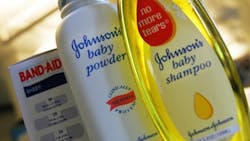Johnson & Johnson’s (IW 1000/45) disappointing first-quarter sales highlighted why the world’s largest health-care company made its biggest-ever deal earlier this year.
Three key drugs fell short of analysts’ estimates in the first quarter. And while the blockbuster arthritis treatment Remicade did avoid a major fallout, sales still dropped 6% from a year earlier during the first full quarter in which the treatment faced competition a Pfizer Inc. copycat version of a drug known as a biosimilar. J&J’s stock fell as much as 3.5%, the biggest drop in more than a year.
One quarter is still early to assess how big an impact the Remicade copycat will have on J&J’s biggest drug in the coming years, but analysts anticipate it will make a major dent in 2019 and 2020.
With other medicines slowing down, J&J made a bold bet in January with the $30 billion purchase of Swiss drugmaker Actelion, a leader in treatments for a rare type of high blood pressure that fulfills its goal of gaining a new drug category.
J&J shares were down 3.3% to $121.63 at 10:35 a.m. in New York on April 17. They had gained 9.1% this year through close on April 17.
Biosimilars
While biosimilars have long been approved in Europe, Pfizer’s Inflectra was only the second such copycat in the U.S. when it was introduced last November. Remicade’s first-quarter sales, while dropping, still did better than the 8.7% slump analysts predicted on average.
CFO Dominic Caruso said J&J anticipated that Remicade would hold its ground against the competition from Inflectra. A biosimilar must go through extra steps before being swapped for its branded version in the U.S., and there’s no interchangeability guidelines yet from the health regulator.
“We did not anticipate we would see much of an impact, and we didn’t,” he said in an interview. “It’ll take time for physicians to get comfortable prescribing a biosimilar to new patients."
Sales of blood thinner Xarelto, diabetes medicine Invokana and cancer drug Zytiga -- which are among J&J’s 10 top-selling treatments -- disappointed last quarter. Invokana was hurt by price pressure, Caruso said.
Raising Forecast
J&J also increased its annual sales forecast on April 18 to reflect the Actelion purchase to $75.4 billion to $76.1 billion. The New Brunswick, N.J.-based company also raised its earnings outlook to $7 to $7.15 per share, excluding some items. Analysts anticipated $7.05.
In the first quarter, earnings of $1.83 a share, excluding some items, beat the average estimate of $1.77.
The company continues to explore the possibility of selling or finding a partner for its diabetes-care business, CFO Caruso said, adding there’s no timetable for a potential deal. The $2 billion business drew interest from private equity firms, people familiar with the matter said in March.
Drugmakers are under intense pressure to reduce prices amid an outcry from members of Congress and U.S. customers. President Donald Trump has said drug prices need to come down, and in January he accused the industry of “getting away with murder.” In February, the company released its first-ever "transparency report" showing that its U.S. prices rose 3.5% in 2016 after discounts.
By Jared S. Hopkins
About the Author
Bloomberg
Licensed content from Bloomberg, copyright 2016.
